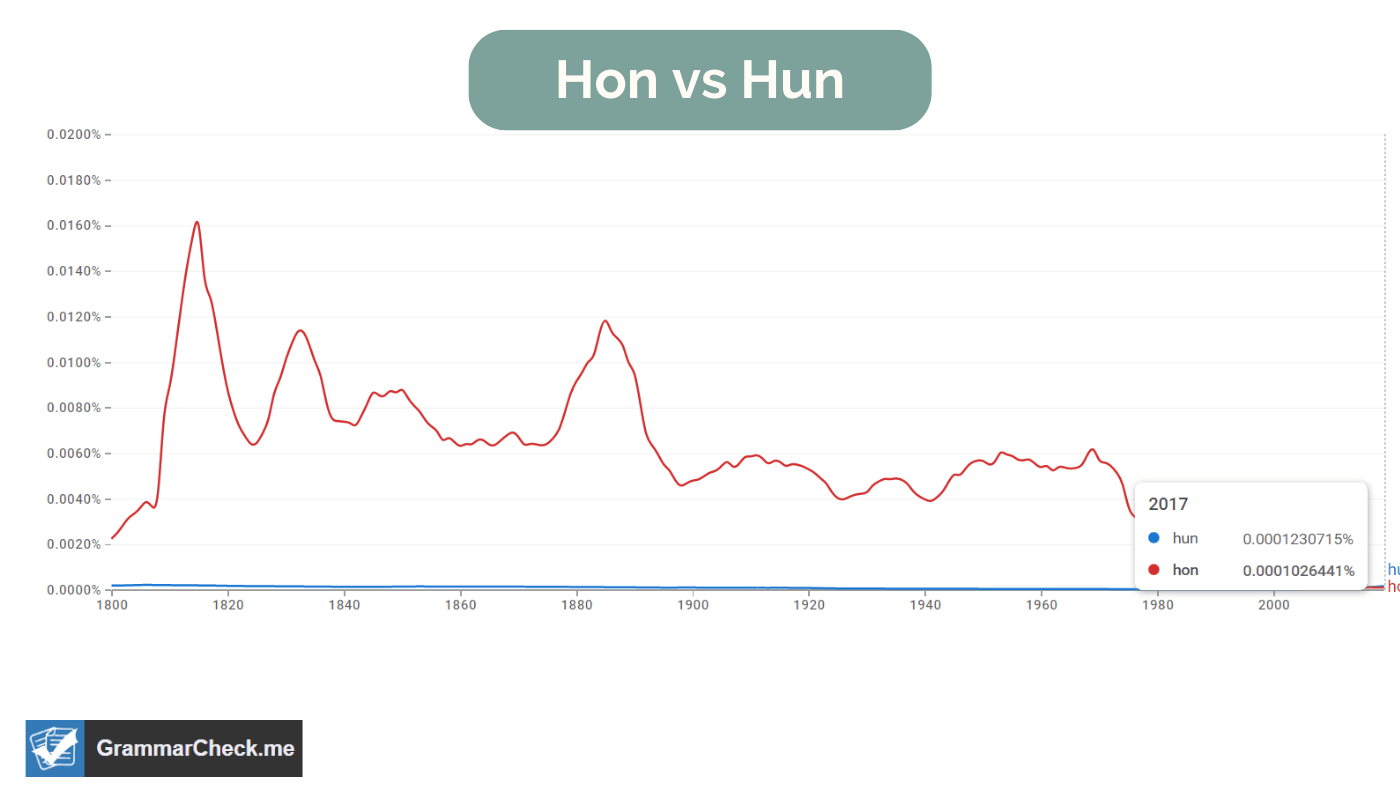If you have a grandmother, chances are you have been called hon or hun more times than you can count. At first glance, both of these words seem to be the shortened form of honey. But which spelling is correct? In this post, we’ll help you decide between hun and hon so that you can master this simple spelling rule.
Which Is The Correct Spelling: Hun or Hon?

Both hun and hon are colloquial terms similar to the terms momma and mama. That’s right, you won’t be using them in any formal research papers anytime soon! But which spelling is correct?
The truth is…both words can be used correctly! “Hon” and “hun” are both informal terms of endearment that are used to address someone, usually a woman. These words are most commonly used by:
- Family members
- Close friends
- Elders
Both “hon” & “hun” are the short or slang versions of “honey”. Slang words like yep and yup should not be used in formal communication. The word “hun” is a more personal version that is more appropriate for family members like a grandson or nephew. Another example of slang is saying “Where you at” instead of “Where are you?”
Takeaway: Both “hon” and “hun” are informal versions of the word honey used to refer to close friends and family members.
Sentence Examples
Here are some examples of how you might use the words “hun” and “hon” in your writing.
- “Hey hon, how was your day?” (asking your niece how her day was)
- “Thanks for picking up the groceries, hun.” (A mom asking her daughter to pick up groceries)
- “I’m sorry if I was short with you earlier, hon. I was just having a bad day.” (A man apologizing to his girlfriend)
- “Is everything okay, hun? You seem a little stressed out.” (A grandmother asking her grandaughter a question)
When To Use Hon
As we already mentioned, the word “hon” is a slang term that is used as a shortened form of the word “honey” which is used as a term of affection. Slang terms like hon and me either vs me neither should not be used in any formal context. Here are a few examples of how the word “hon” might be used:
- “Thanks for your help, hon. You’re a lifesaver!”
- “Hey hon, how did you play at the basketball game?”
- “Don’t worry about it, hon. Everything will work out.”
When To Use Hun
The word “hun” is also a colloquial term that is used to an alternate form of “honey.” It is used very similarly to auntie or aunty in your writing. Compared to “hon”, this word is more personal and affectionate. You should only refer to people close to you as “hun.” Here are a few examples:
- “Thanks for your help, hun. I wouldn’t be here without you!”
- “Hey hun, can you grab me some coffee?”
- “Don’t worry about it, hun. I’m sure you will get the job.”
Which Is More Popular?
The word hon is has been extremely popular over the last 100 years. One look at Google’s ngram and you can see that it was frequently used in literature as an alternative form of honey.

However, nowadays both words have lost their popularity and are rarely used in formal settings. Hun is the more popular shortened form of honey. However, “hon” is more commonly used in North American English, while “hun” is more commonly used in British English.
Frequently Asked Questions
Both “hon” and “hun” can be used as shortened forms of “honey”. They’re both fairly informal terms, and are more popular in different parts of the country.
Hon is a term of endearment often used in text messages and other forms of informal communication. It is most often used to refer to women and gay men.
Yes, Hun can be used as a nickname. It’s an affectionate term used to refer to a close friend or family member. For example, a grandmother may refer to her grandson as “hun”. This is another way of saying “sweetie”.
Although hun is primarily an alternative form of honey referring to women, it can also be used for men. Calling someone “hun” is equivalent to “sweetie” or “sweetheart”. This is an informal term that is used for family members or close friends.
The Bottom Line
By now you know that both hon and hun are a shortened version of the word honey. Hun is more of a slang term that is more appropriate when referring to a relative or very close friend. Hon is a bit less personal and is used as a term of endearment. If this spelling rule is tripping you up, use our FREE grammar lookup tool to make things easy!
